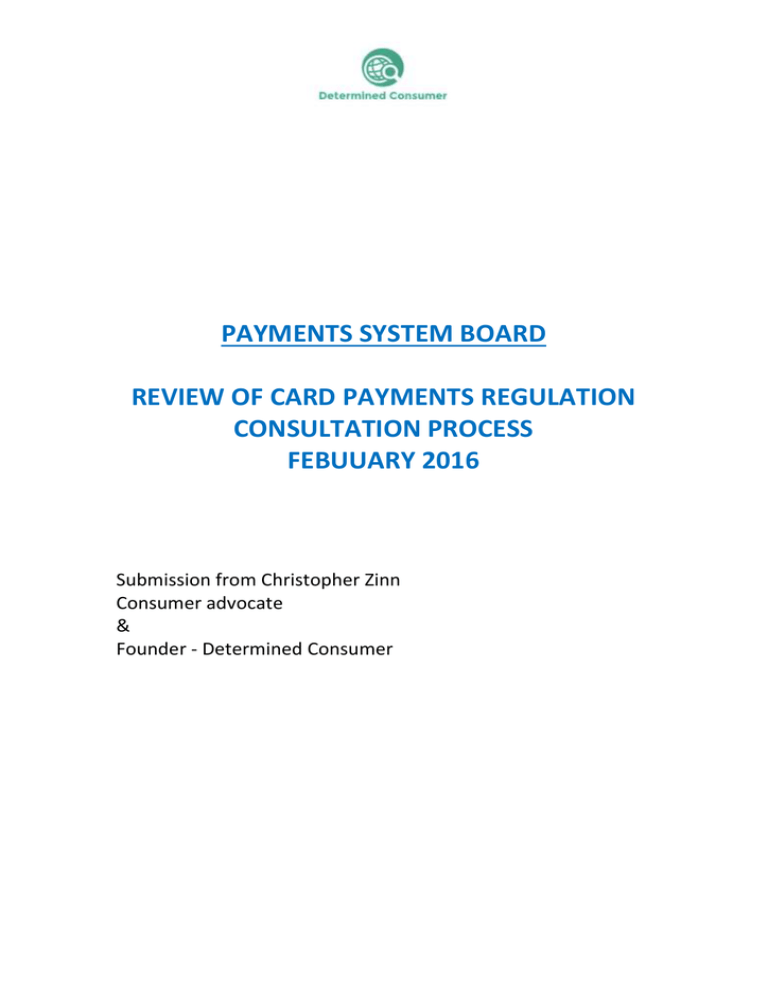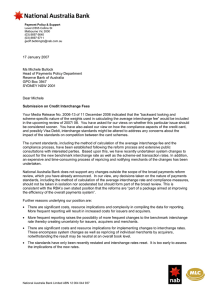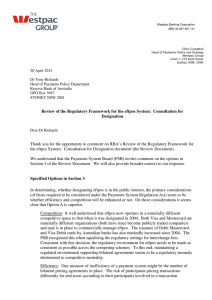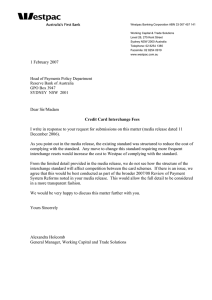PAYMENTS SYSTEM BOARD REVIEW OF CARD PAYMENTS REGULATION CONSULTATION PROCESS
advertisement

PAYMENTS SYSTEM BOARD REVIEW OF CARD PAYMENTS REGULATION CONSULTATION PROCESS FEBUUARY 2016 Submission from Christopher Zinn Consumer advocate & Founder - Determined Consumer BACKGROUND Determined Consumer is an initiative designed to drive consumers to engage with, and benefit from, the consumer empowerment revolution. Technology is arming consumers with information, the ability to aggregate their demand and direct influential channels to producers. We believe keeping the consumer revolution on track needs the attention, action and aggregation of those who are determined to share in the work and drive pro-consumer change.. I work in the emerging marketplace of consumer empowerment such as groups increasing their bargaining power as in the Big Electricity Switch of 2012 which attracted 250,000 households. Such movements can drive pro-consumer change in markets faster and arguably better than regulation. The concept is described as the coming of Next Generation Intermediaries offering better market engagement and better outcomes for consumers for less effort http://www.consumerfutures.org.uk/files/2014/01/Next-Generation-Intermediaries.pdf I am currently working towards this goal with new wave consumer groups, which are also social businesses, such as The Fifty Up Club a venture for older Australians from One Big Switch. I’ve been part of a campaign called Get Credit Score to empower consumers by giving them back data about their perceived credit worthiness. I also consult with a number of businesses especially start ups, particularly in the FinTech (financial technology) area to sharpen their consumer focus. 1 INTERCHANGE FEES The purpose of my submission, which I make as an individual with some track record as a consumer advocate with an interest in payment systems, is to argue for a broader definition of the ‘consumer interest’ and where it lies. I restrict my comments to the interchange issue and applaud the moves to finally crackdown on opportunistic credit card surcharges; especially the pernicious practice of charging fixed fees as opposed to fairer percentage amounts. Maintaining the current system for interchange will, in my view, benefit the majority of consumers. However there is uncertainty as to how long this may last given the PSB’s stated view that does not recognise the value interchange provides to consumers. The risks of regulation through any further moves to lower the IC rate include: Restricting consumer access to and benefit from credit card services which are funded via IC including fraud protection, chargeback and interest-free periods. Higher costs to consumers through banks shifting the costs of lower IC income to their customers by raising annual fees and other charges. Merchants failing, despite various predictions from pundits, which have proved impossible to evaluate, to pass on any cost savings through lower IC in the form of lower prices. The smaller banks, credit unions and financial institutions, which are far more exposed to lower income from any regulation of IC, may be curtailed from offering their current lower rate credit cards A consequence of the ‘reductions in the generosity of rewards programs’, to use the words of the PSB could extend beyond premium and companion cards and impact competition in a market which needs more of it and not less. While some of the consumer movement in Australia have consistently supported RBA regulation of interchange fees this view is not universally held. Overseas and particularly in the UK it’s been argued the benefits of unregulated interchange to consumers in terms of fraud protection, chargeback and even loyalty schemes stimulating competition far exceed any costs imposed by unregulated IC. In the United Kingdom consumer bodies, (including the Centre for Responsible Credit, Money Advice Trust, The Money Charity, Christians Against Poverty and the influential Moneysavingexpert.com) issued the following joint statement on their concerns about the European Commission’s bid to regulate interchange in 2013. http://www.parliament.uk/documents/commons-committees/europeanscrutiny/Consumerbodies.pdf 2 To extract some key points from their statement: As UK consumer bodies we have serious concerns that there may be considerable unintended consequences and significant detrimental effects of proposed changes in interchange regulations on card transactions. As groups representing consumers in the UK, we are concerned that the Commission’s proposals will result in less competition in the market, thereby punishing both ‘savvy shoppers’ and more vulnerable consumers through restricting access to credit, limiting its flexibility and increasing its cost. The PSB paper suggests the 2003 regulation of interchange was an unqualified benefit to consumers and that the worst predications of the industry did not come to pass. There is however considerable evidence, as outlined in my submission to the 2015 Senate Inquiry into interchange and other credit card fees, that merchants failed to pass on any definable or recognisable material savings they made in lower IC costs in the form of lower prices. In addition there is also evidence the banks made up for the lower IC fees by increasing their annual fees and charges to card holders. (You can access my original submission #28 http://www.aph.gov.au/Parliamentary_Business/Committees/Senate/Economics/Credit_Car d_Interest/Submissions ) In questions and answers 8 and 9 of the document http://www.rba.gov.au/payments-andinfrastructure/resources/qa/card-payments-regulation.html it’s also claimed: It is also possible that there may be some adjustment in annual fees on these cards …the reforms should place downward pressure on the prices of goods and services faced by all consumers. The PSB has made the right call so far on what all sides admit is a complex issue. It now needs to make a more longterm commitment to ensure average consumers are not impacted by intentions to regulate interchange. 3 RECOMMENDATIONS The Payments System Board should: 1. Make a long-term commitment to maintaining the current interchange system given the significant risks of regulation and the benefits interchange can provide Australian consumers. 2. Be mindful of the effects of regulation overseas: expert testimony and analysis on the impacts on consumers of regulating interchange fees in other countries should form a key part of the consultation process. 3. Consider the interests of those who use and accrue points and the role of such schemes in driving and not inhibiting competition. 4. Foster policies which encourage innovation and competition in the payments system by not unduly reducing the incentives for new players to enter the market. 4



